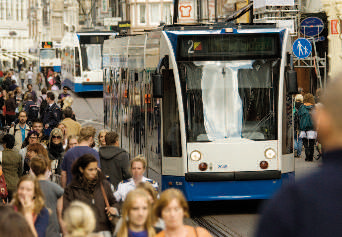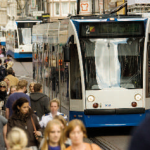The public transport systems in the 3 largest metropolitan
areas in The Netherlands are facing severe budget cuts
starting 2013. As part of a national government program of
public expenditure cuts of around €18 million, the Dutch
government has imposed a €120 million cut on the budget
available to Amsterdam, Rotterdam and The Hague for
transport and maintenance of transport infrastructure.
In the case of Amsterdam this could lead up to a decrease of
services of up to 40%.
Stadsregio Amsterdam has calculated that some tram routes
and many bus routes will have to be curtailed or even
cancelled. This could result in a reduction of the tram and
bus networks to mainly trunk routes.
According to consultants assigned by the Minister the maximum
that can responsibly be economized by a higher efficiency of
the transport operations is about €8 million per year.
That does not even come close to the imposed cutbacks that
The Hague assumes as feasible, provided the Amsterdam PT
(Public Transport) concession for bus tram and metro is
tendered out.
For 2015-2018 the annual cuts in Amsterdam PT will have to
result in some €70 million to be achieved on a level of
expense of €122 million for running cost, €94 million for
infrastructure (maintenance) and €19 million for social safety. The minister has alleviated this cut somewhat by compensation of €23 million for the 3 cities, €10 million of which is intended for Amsterdam.
Even with these reductions the government budget cuts of €70 million for Amsterdam alone seems unachievable. Survey carried out by Stadsregio has indicated that this could entail the cancelling of 3 of the 16 tramlines and 25 of the 44 bus services and the curtailing of 4 city bus routes, in order to reach a saving of €33 million by the end of 2015. A raise of fares of 15 percent could yield some €15 million additional budget, even though a fare raise would demand the cooperation of 16 different regional authorities across the country.
Stadsregio considers the imposed cut backs as unrealistic and a major intervention in urban PT that will have adverse
impacts on accessibility, quality of life and on economic
recovery. The Executive Board believes last year’s directly
award of the urban transport concession to GVB should be
respected until 2018. In that contract running costs have been reassessed based on market conformity, yielding to a
€28 million less expenditure.
The overall cutback of €120 million for the 3 greater cities is linked to the general obligation to tender, becoming
effective by January 2013. The obligation adds on an overall
cutback on transport budgets of 5 percent nationwide and
the abolition of annual price compensation.

If services become less frequent, fewer passengers will
expect to travel with PT. Users in the city and people coming
from outside to city centre depending on bus tram or metro
to reach their destination will have to seek alternative modes of travel (cycling, car).
Initially weaker bus routes will be curtailed or cancelled,
sometimes routes will suffer from lower headway or fewer stops. Fare box revenues are likely to drop and provide for a decrease in cost coverage. To which extent service levels are actually expected to be lowered becomes clear by December 2011.
For more: regiohuis@stadsregioamsterdam.nl
